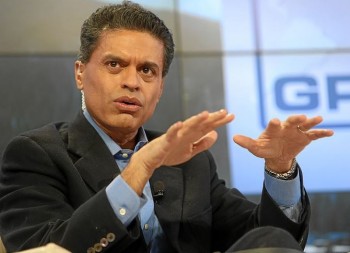
Fareed Zakaria in 2013 (Credit: Wikipedia)
Washington Post, Slate and Newsweek are all adding editor’s notes to CNN journalist Fareed Zakaria’s work after attribution complaints.
Five of Fareed Zakaria’s columns for the Washington Post are “problematic” for a lack of attribution, the Post‘s media reporter Paul Farhi reported.
Attribution issues with the columns were spotted by the anonymous blog Our Bad Media, which previously has tracked work by Zakaria that it said has attribution issues. Zakaria was suspended by CNN and Time in 2012 after apologizing for “close similarities” between his article for Time and Jill Lepore’s earlier article in the New Yorker.
In a Nov. 10 post, Our Bad Media listed six articles with problems in them.
In response to the post, Fred Hiatt, the editorial page editor who previously criticized Our Bad Media’s collection of Zakaria’s work, acknowledged five of the six cases “strike me as problematic in their absence of full attribution,” the Post reported.
The five articles Hiatt agrees have problems were published before the Washington Post suspended Zakaria to review his work for plagiarism, the newspaper noted.
However, the Post didn’t explain why those articles didn’t raise flags during the 2012 review of his work. Hiatt said the newspaper will likely disclose that lack of attribution with notes on the columns.
iMediaEthics asked Hiatt when the notes will be up, if Zakaria gave any explanation for the errors and how the Washington Post missed these issues when reviewing Zakaria’s work in 2012.
Hiatt told iMediaEthics via e-mail: “We will have the notes up today or tomorrow. I think they will be for four columns, not five.”
Hiatt explained the need to acknowledge the attribution errors: “This is unfair to readers and to the original sources,” Hiatt told the Post. “We will take a fuller look over the next day or two, but we probably will attach messages to the archived editions of the five original columns.”
The Washington Post isn’t alone in responding to Our Bad Media’s complaints about Zakaria’s work.
Slate: Zakaria’s 1998 article ‘does not meet Slate‘s editorial standards’
Slate added an editor’s note to a 1998 column by Zakaria, “Toward the Wet Martini.” The editor’s note reads:
“Editor’s note: This piece does not meet Slate’s editorial standards, having failed to properly attribute quotations and information drawn from Max Rudin’s history of the martini, which appeared in American Heritage in 1997. Slate regrets the error.”
Politico’s Dylan Byers reported that Slate editor-in-chief Jacob Weisberg, who previously criticized Our Bad Media for “bullying vigilantism,” e-mailed to say he disagrees with the decision to append a note on Zakaria’s article. He wrote,
“I have to distinguish my own view here from Slate’s editorial decision, which I respect but don’t agree with. In the 1997 piece in question, Zakaria cites, praises and links to the American Heritage article on martinis. From my perspective, that was sufficient, even generous attribution.”
Weisberg added that Slate didn’t call the attribution issues the P word, plagiarism, and argued Our Bad Media is “making mountains out of molehills” and “applying an academic standard of attribution” instead of what he said is a more realistic standard for journalism.
Newsweek adds 7 editor’s notes
Further, a third publication that has run Zakaria’s work, Newsweek, has taken steps to disclose possible attribution issues with Zakaria’s work.
Newsweek previously put a note on Zakaria’s author page inviting readers to notify them of any attribution issues to review.
Now, New York Magazine reported that “Newsweek removed the editor’s note from all of Zakaria’s work and put specific corrections on seven articles.” According to a Nov. 7 Newsweek article,
“After careful review, Newsweek has removed its blanket correction notice from Zakaria’s author page, and has instead appended specific corrections to those articles that Newsweek staffers felt warranted them.”
Newsweek also interviewed by e-mail the two people behind Our Bad Media, who identify themselves as CrushingBort and BlippoBlappo.
The two said that they aren’t and don’t want to be reporters. “We’re not reporters, and we are not looking to use our posts on plagiarism as a means to land a job in the industry,” BlippoBlappo wrote. They instead started looking for plagiarism and attribution issues after checking out BuzzFeed’s Benny Johnson’s work because he “was a strongly dislikeble person.”
Johnson was fired this summer from BuzzFeed for plagiarism, as iMediaEthics wrote at the time. The pair turned to Zakaria in light of the plagiarism accusations against him in 2012.
iMediaEthics asked Zakaria’s employer CNN for comment regarding the round of editor’s notes. CNN pointed to its previous statement:
“CNN has the highest confidence in the excellence and integrity of Fareed Zakaria’s work. In 2012, we conducted an extensive review of his original reporting for CNN, and beyond the initial incident for which he was suspended and apologized for, found nothing that violated our standards. In the years since we have found nothing that gives us cause for concern.”





